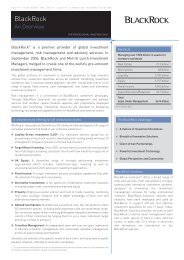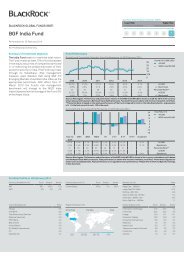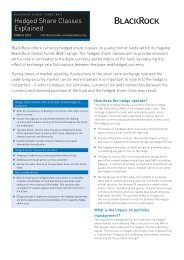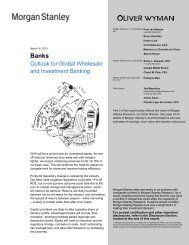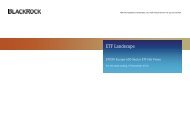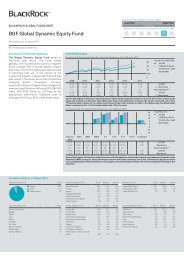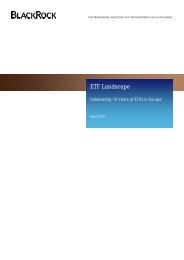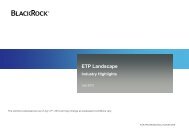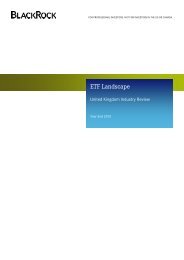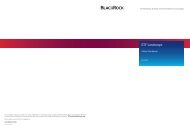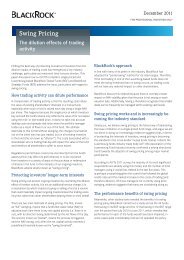Prospectus (4.96 Mb) - BlackRock International
Prospectus (4.96 Mb) - BlackRock International
Prospectus (4.96 Mb) - BlackRock International
You also want an ePaper? Increase the reach of your titles
YUMPU automatically turns print PDFs into web optimized ePapers that Google loves.
changes in the capital markets inhibit or eliminate exploitation of the External Investment Advisor’s investment edge, the<br />
Investment Manager will seek to liquidate the particular Fund Investment, subject to the governing documents of such<br />
Fund Investment relating to redemptions or other structural terms of the Fund Investment.<br />
The existence of an investment edge, whether qualitative or quantitative, is not the sole determinant for allocating money<br />
to an External Investment Advisor. Ultimately, the task of managing money lies with people. The Investment Manager<br />
believes that there is no substitute for knowing the people associated with an External Investment Advisor and evaluating<br />
their underlying motivation, commitment, experience and integrity. Additionally, it is important to understand the<br />
accounting, operational and administrative controls which an External Investment Adviser has in place.<br />
The primary emphasis of the evaluation process is to form an opinion of an External Investment Advisor’s investment edge<br />
and personal character and to determine whether these can add value in the form of superior risk-adjusted returns. This<br />
evaluation is conducted by the Investment Manager through on-site visits, analysis of investments and/or discussions with<br />
the investment personnel associated with an External Investment Advisor and by maintaining a dialogue with independent<br />
academic and financial industry specialists worldwide.<br />
In addition, when evaluating External Investment Advisors, there are certain business standards that are sought in each<br />
External Investment Advisor. Generally, the Company will seek to allocate its assets to External Investment Advisors who:<br />
• invest substantial personal assets in the Absolute Return Strategy being pursued on behalf of the Fund Investment or<br />
have significant personal career and financial risk associated with their investment management activities;<br />
• utilise an investment fee that is dependent on investment performance;<br />
• provide annual audited financial statements from an independent public accountant;<br />
• devote their primary business activities to investment management and generate the majority of their business<br />
income from such activities; and<br />
• have specific and relevant experience managing assets.<br />
PORTFOLIO STRUCTURING<br />
General<br />
The Company will seek to allocate its assets primarily to a diversified group of External Investment Advisors. This process<br />
is dynamic, reflecting the Investment Manager’s view on the relative attractiveness of different strategies utilised among<br />
and within the four broad disciplines of ARS in which the Company invests. The allocation process is designed to allow the<br />
Company to maintain the flexibility to redeploy assets as investment opportunities change. The Company’s specific<br />
portfolio composition will be influenced by a number of factors, including, but not limited to, the Company’s investment<br />
guidelines, the Company’s specific terms and conditions and the investment judgment of the portfolio manager assigned<br />
to the Company by the BAA Investment Oversight Committee (the “Investment Committee”). Specific portfolio structuring<br />
decisions are affected by factors such as the availability or capacity constraints of potential Fund Investments, structural<br />
considerations such as the liquidity terms of potential Fund Investments alone or in the aggregate compared to the<br />
Company’s structural characteristics, the level of fees of potential Fund Investments, and other considerations. Such<br />
considerations will most likely result in differences in composition and performance among other investment fund<br />
portfolios or separate accounts managed by the Investment Manager, even when overall investment or performance<br />
objectives are similar.<br />
Affiliated Funds<br />
The Investment Manager and its affiliates act and intend to continue to act as investment manager, general partner,<br />
managing member or in a similar capacity for other investment funds with investment objectives and/or philosophies<br />
similar to that of the Company (the “ARS Affiliated Funds”). In pursuing the Company’s investment objective and in<br />
connection with the Company’s diversification guidelines, the Investment Manager may allocate a portion of the<br />
Company’s capital to direct and indirect investments with such ARS Affiliated Funds.<br />
The Investment Manager may create one or more conduit funds (together with any ARS Affiliated Funds, the “Affiliated<br />
Funds”) through which the Company, certain ARS Affiliated Funds and other accounts managed by the Investment<br />
Manager or its affiliates may invest for the primary purpose of consolidating investments by these accounts into a single<br />
investment in one or more underlying Fund Investments. Although consolidating the assets of the Company and those of<br />
other investment funds and accounts managed by the Investment Manager should provide the Company a certain degree<br />
of efficiency and other potential benefits, there are additional costs and risks associated with an Affiliated Fund or similar<br />
structure. See “Risk Factors — Risks Relating to the Investment Strategy — Investment in conduit entities”.<br />
The Investment Manager and its affiliates manage funds or accounts for Other Clients whose investment objectives and/or<br />
philosophies may overlap, or be complementary to, the investment strategies and/or philosophies pursued by the<br />
Company, and both the Company and Other Clients may be eligible to participate in the same investment opportunities.<br />
Additionally, Fund Investments are generally offered in private offerings and it is not uncommon for Fund Investments to<br />
become closed or limited with respect to new investments due to size constraints or other considerations. Moreover, the<br />
Company or Other Clients may not be eligible or appropriate investors in all potential Fund Investments. As a result of<br />
51



